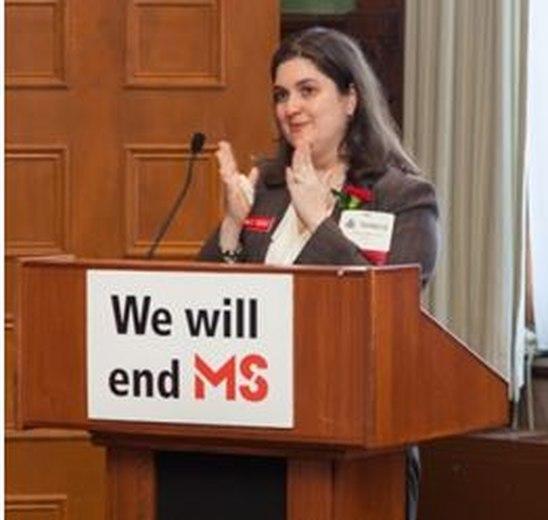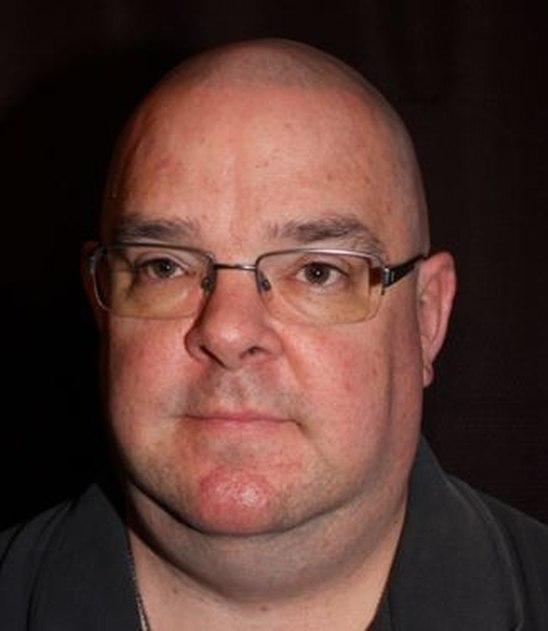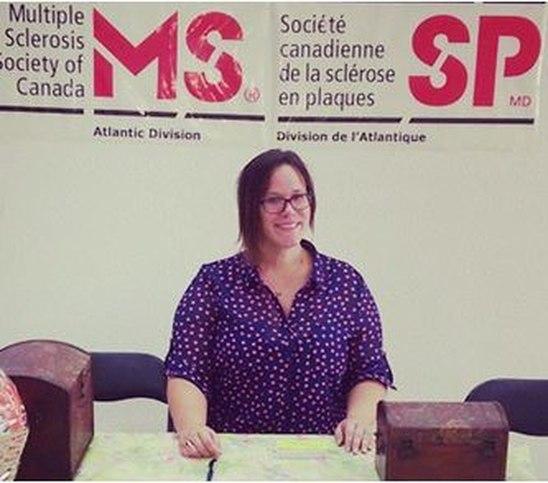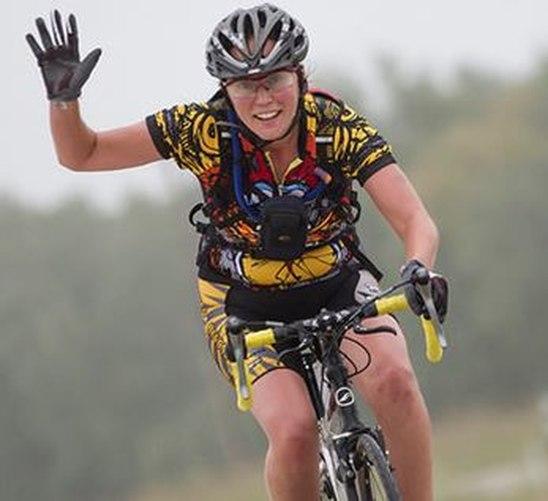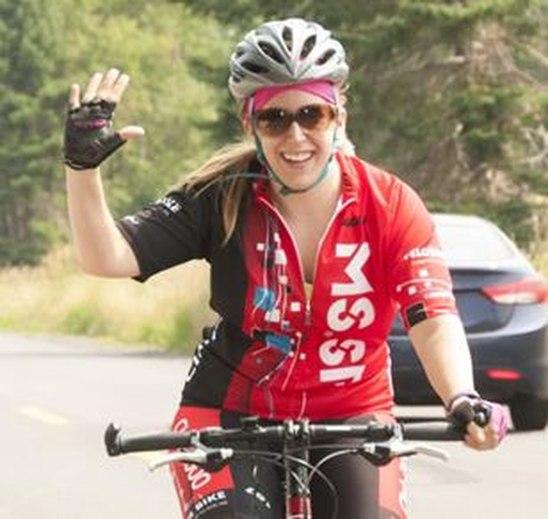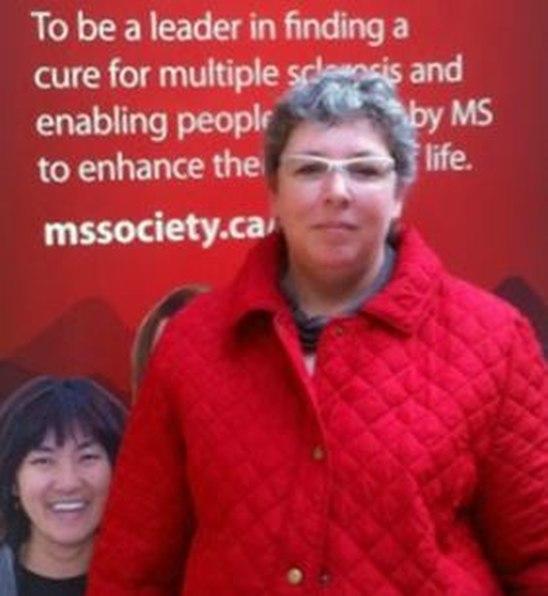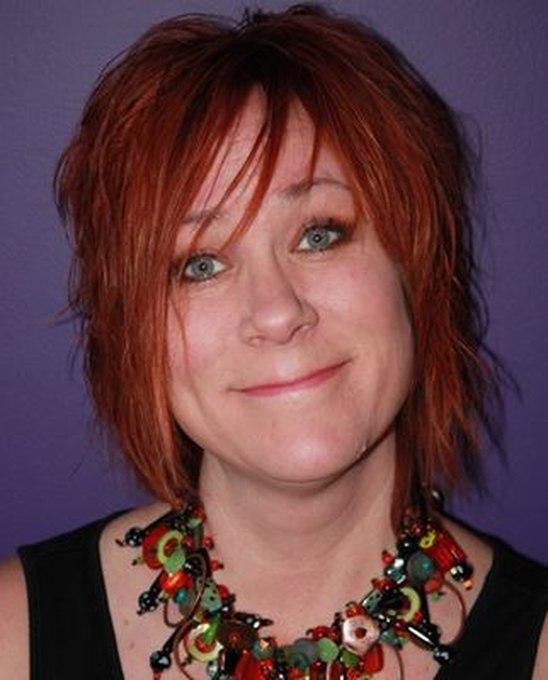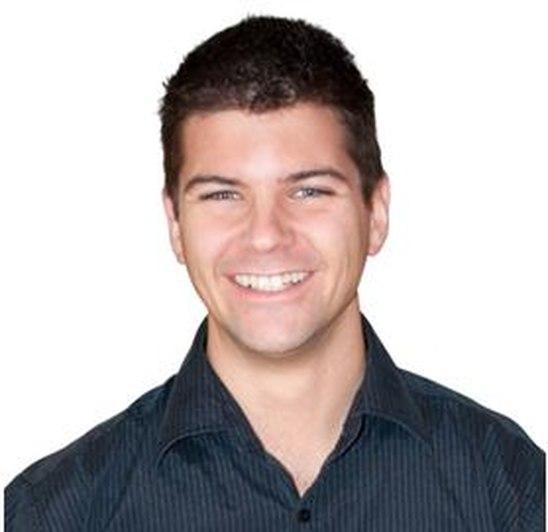Gaby Mammone
Gabriella (Gaby) Mammone is a highly inspirational and touching advocate for living well with MS. Empowered by her own experiences of overcoming adversity, Gaby is extensively involved in the MS Society as a public speaker and official MS Ambassador. She has lent her voice and background in event planning to the MS Walk, the MS Golf Tournament, 1DayinMay, MS Read-A-Thon, and numerous galas. As an experienced speaker, we were delighted to have Gaby come share her thoughts and ideas in the Annual Independent Review Process.
For Gaby, “It was an honour to be amongst such a prestigious team and offer my feedback. As someone affected by MS, it was also so motivating to see the research that’s being done and – as an outsider looking in – it was so reassuring to see that the funding was allocated properly and the process that was taken to get there.”
Read the full interview below!
Full Interview
What made you interested in becoming a Community Representative?
I am an avid volunteer with the MS Society and appreciate that these opportunities help me grow and contribute to my learning. I was interested in becoming a community representative because I was interested in understanding more about the grant process (which I absolutely did!).
How would you describe the research review process to a friend, family member, or member of the public?
I have spoken about the process very positively to my friends/family. I was very excited to tell them how organized and clear the process was. It was an honour to be amongst such a prestigious team and offer my feedback. As someone affected by MS, it was also so motivating to see the research that’s being done and that funding really does go to research! It was so reassuring to see that the funding was allocated properly and the process that was taken to get there.
How has your view of the MS Society’s process of funding scientific research changed after participating in the review process as a Community Representative?
Sometimes the media can tarnish the opinions of people when articles are released about where charity funding actually goes. As a fundraiser, I felt so good knowing that the money I personally raise goes to helping those affected by MS. I also benefited in learning more about how funding is being used. The goal really is to find a cure and it was just so reassuring (almost beyond words) to know how many different studies were being done to help us achieve the goal. Learning more about the professionals that have a passion to learn more about their mission was so motivating.
How has your level of interest in MS research changed through your participation in the review process?
I am definitely more interested than ever in learning more about MS research. Personally I have always been intrigued by the brain and knowing that there are studies about lesions, progressive MS and how mice are being used to obtain results is very reassuring. I continue to do research on a personal level and subscribe to newsletters in this regard to keep myself abreast.
Based on your experience, how important is the involvement of people affected by MS in the process of funding scientific research? What perspectives were you able to share with the committee?
I commend the MS Society for involving community involvement because someone living with MS may see a situation differently than someone that doesn’t. I was happy to share my thoughts with the committee and do feel that my voice was heard.
What part of the review process did you enjoy the most and why?
It is difficult to narrow this answer to one response because there are many facets I enjoyed. Meeting the professionals that understand the grants and provide their valuable and noteworthy feedback was very motivating. I also very much enjoyed learning about the process of allocating funding for the purpose of reaching our Mission.
What take home message would you provide to future applicants and people in the community about your experience as a community representative?
Take a lot of time to review the grants in advance and go back to them. Make copious notes and be open to sharing your thoughts.
The overall process was incredibly motivating and inspiring. I appreciated the opportunity to be part of the committee and thank you very much for allowing my involvement.
Dean Walker
Dean lost his father to MS at the young age of 19.
After coming to a better understanding of the disease following
conversations with his father’s neurologist, Dean dedicated
himself to fundraising and doing advocacy work for MS. Dean is
currently a member of the Board of Directors of the Albert and
Northwest Territories Division. He has also served as a MS
Ambassador for several years, wherein he has assisted in the
editing of the weekly MS Ambassador newsletter.
After two consecutive years of lending his voice and insights to the Independent Review, now more than ever, Dean believes that, “It is very important that the MS community is involved in the process to ensure the money is going to the right researchers. The most important thing I wanted to share with the committee especially the researchers is that the MS Patients are people not just a disease. I was pleasantly surprised both years I sat on the committee the scientists were all about treating the patient not just the disease.”
Full Interview
What made you interested in becoming a Community Representative?
I became interested to find out how the process works and to find out what research is being done to endMS.
How would you describe the research review process to a friend, family member, or member of the public?
The process begins with the primary investigator or student filling out a grant application, then their application is reviewed by fellow scientists and a lay reviewer. Depending on the score, the application is pushed up to the next level for final approval.
How has your view of the MS Society’s process of funding scientific research changed after participating in the review process as a Community Representative?
It’s a very complex process and helps to guarantee the funds are put to the best use.
How has your level of interest in MS research changed through your participation in the review process?
It has increased significantly and made me more aware of all the different aspects of research that are taking place.
Based on your experience, how important is the involvement of people affected by MS in the process of funding scientific research? What perspectives were you able to share with the committee?
It is very important that the MS Community is involved in the process to ensure the money is going to the right researchers. The most important thing I wanted to share with the committee especially the researchers is that the MS Patients are people not just a disease. I was pleasantly surprised both years I sat on the committee the scientists were all about treating the patient not just the disease.
What part of the review process did you enjoy the most and why?
I enjoyed the committee meeting. It was nice to get to know the other reviewers and being a part of the process.
What take home message would you provide to future applicants and people in the community about your experience as a Community Representative?
It was a very worthwhile experience. The research going on in the MS world is very relevant and is ground breaking. It shows that there is HOPE!
If anybody is unsure about taking part they should just do it. It is very satisfying to take part in the process and know that one of these fine young scientists might just come across the cure to ENDMS.
Jenny Gauthier
Jenny was diagnosed in 2010 with Relapse Remitting MS (RRMS). In the face of the challenges this diagnosis has entailed, Jenny brings incredible positivity and energy. She is an educator and lifelong learner who has taken on high-profile positions of leadership in her community which allow her to share her inquisitive spirit and positive outlook. She is a middle school teacher in Campbellton, New Brunswick, Chair of the MS Society's Restigouche Chapter, and key fundraiser for the MS Walk in Dalhousie.
It is no surprise that Jenny brought these qualities to the role as a Community Representative on the Independent Review Personnel Committee. A highlight for her was witnessing the passion of the scientific reviewers as they debated the fine details of individual grant applications. According to Jenny: “The review was by far, one of the most interesting, informative, and unique experiences that I have ever been a part of! The research that professionals in all sorts of fields are doing, proposing and thinking of, to change the future of MS is unbelievable!”
Read the full rundown of Jenny’s reflections in the interview below.
Full Interview
What made you interested in becoming a Community Representative?
I was interested in becoming a community representative because the idea of being part of the future advances in MS was very appealing to me. As I am the current chair of my community chapter, it was very important to me to be involved in this significant aspect of the work that the MS Society does.
How would you describe the research review process to a friend, family member, or member of the public?
Since my return from Toronto, I have spoken about the process of the research review panel to many people including; family, friends, coworkers, my students, the members of my chapter and I also had an interview on my local radio station. I have explained the process in the following terms: The research review and acting as a community representative was an extremely enlightening process.
First of all, there were two scientific reviewers (a primary reviewer and a secondary reviewer) and a community representative assigned to review each proposal in depth. We each gave constructive criticisms for each proposal and feedback as to how the research would be important for people in the MS community. Each proposal was then graded by the entire committee on a scale to help identify which projects stood out.
It was interesting to learn that each proposal was treated like a “job interview”. Credentials, reference letters, past research projects among other things were closely looked at for each candidate to assess feasibility of a proposal as well as the idea itself. The group of scientific reviewers and community reps each had their turn to input their opinions on each project. It was a very lengthy process, but it was well worth the work as the outcome is a very important part of the process in deciding which projects receive the money to go forth with their research.
How has your view of the MS Society’s process of funding scientific research changed after participating in the review process as a Community Representative?
To be honest, I didn’t really know a whole lot about the processes in the funding of scientific research to begin with. This experience was very educative and put my mind at ease. Now I have a better idea of where fundraising money is spent over time. We as volunteers work extremely hard at raising money and organizing events such as the MS Walks and we dedicate much of our time to help support MS. Essentially, my perspective is that our hard work results in money well spent.
How has your level of interest in MS research changed through your participation in the review process?
I have become much more open minded and positive in regards to MS research due to my participation in the review process. I was officially diagnosed with MS in April 2011. Over the past 4 years, I have become more accepting of my diagnosis and the implications it has on my health and quality of life. My level of interest in MS research has changed drastically over this time span.
Before serving as a community representative, I was interested in more natural ways of treating my MS. Since my participation in the review process, I have become more interested in the current research and results of studies and treatments in MS. Recently, I have been experiencing several new symptoms with my illness. I had numerous different treatment options presented to me by my neurologist. After a lot of research about the different drugs I finally made a decision. I have decided to go on “the pill”, Tecfidera to treat my MS. If it weren’t for research projects, studies and proposals like the ones we reviewed, advances in this field would not be possible.
Based on your experience, how important is the involvement of people affected by MS in the process of funding scientific research? What perspectives were you able to share with the committee?
This was by far, one of the most interesting, informative, and unique experiences that I've ever been a part of! The research that professionals in all sorts of fields are doing, proposing and thinking of, to change the future of MS is unbelievable! The hard work that scientists and specialists put into this disease amazes me and really has opened my eyes to the hope that exists in regards to MS and NMO (a new term to me). It is heartwarming to know that my brain matters not only to myself, but to them as well! It is clear to see, from my standpoint, that although scientists are researching a disease, that it is obviously in the best interest of the people who live with it! Living with the unknown- it is an instructive vehicle for me, on a daily basis! Waking up not being able to see, walk or have little to no feeling in your hands and feet- it is an unimaginable fear: the unknown.
What part of the review process did you enjoy the most and why?
I enjoyed the entire experience of the review. However, if I had to choose one highlight it would be the debates about the fine details and the significance of projects between the professionals in the round table discussions. It was very fascinating to witness their passion.
What take home message would you provide to future applicants and people in the community about your experience as a Community Representative?
My take home message from my experience as a community representative would be that this was an extremely important opportunity that I was able to be involved in, and it’s something that you need to be involved in if you want to have an input on the changes in the future of MS. This review helped me grow as an individual. I tell my students that we are all lifelong learners. If you can learn from an experience, go for it! Imagine if one of the projects I had a strong voice or opinion about even resulted in changing the quality of life in one person; words cannot describe the feeling I would have!
Karen Tweed
Karen Tweed is a woman on the move who refuses to slow for anything, including MS. Karen cycles in the MS Bike Tours as a recognized ‘Inspirational Champion’ and has a background as a competitive equestrian. When she is not riding, Karen puts her degree in Agriculture and Animal Science from the University of Manitoba to work as an Administrative Coordinator for Richardson International in Grain Transportation and Logistics. Prior to this, she was working in sales of Veterinary Pharmaceuticals and Vaccines.
With a background in science and the pharmaceutical industry, Karen brought an incredibly interesting patient perspective to the review discussions as a Community Representative. With an interest in understanding the MS Society’s process of allocating funds, not just as a person living with MS, but as a representative of all those who sponsor her in the MS bike, she was able to think with breadth and precision about the applications we received. As Karen explained to us in an interview following the review: “While I do have a background in science and was able to understand the scientific methods discussed in the proposals, I felt I was best able to contribute by focusing on what the real life application would be to me or others with MS by relating my personal experience.”
Continue reading below to get a full picture of Karen’s Review experience.
Full Interview
What made you interested in becoming a Community Representative?
I first saw the call for applicants on Facebook and was intrigued. I wanted to be a part of the process, to see the kinds of research projects that are considered, to see where the money goes, not just because I am a person living with MS, but also to represent all of those that sponsored me in the MS Bike.
How would you describe the research review process to a friend, family member, or member of the public?
A great collaboration of minds that are truly invested in making sure that only the cream of the crop are put forward for funding.
How has your view of the MS Society’s process of funding scientific research changed after participating in the review process as a Community Representative?
I was impressed with the variety of the proposals that covered many aspects of MS. I was most impressed with how thoroughly the proposals are vetted. It became apparent why it is so important to have a committee looking at the proposals, rather than just a few individuals, as each member of the committee was able to bring a different perspective, to flesh out all the strengths and weaknesses of each proposal that may otherwise have been missed, so that it became clear which proposals deserved to come out on top.
How has your level of interest in MS research changed through your participation in the review process?
I used to think that research was beyond me, but now that I know I am able to make a meaningful contribution to the process, I want to continue to be involved.
Based on your experience, how important is the involvement of people affected by MS in the process of funding scientific research? What perspectives were you able to share with the committee?
While I do have a background in science and was able to understand the scientific methods discussed in the proposals, I felt I was best able to contribute by focusing on what the real life application would be to me or others with MS by relating my personal experience. With respect to the lay reviews I focused on what is the impact to MS and was it clearly communicated in the proposal and I found that in general this was not clear in the lay reviews. The committee members were able to determine the soundness of the methods, credentials, and relevance of the research proposals, whereas I felt that I was able to speak to the patient perspective and the real world application of the research proposed.
What part of the review process did you enjoy the most and why?
I really enjoyed the discussions. I was nervous at first that I may have “missed the point” with some of my review comments, so it was great to hear the various points of view and gain a greater understanding of the proposals and realize that I wasn’t off base, rather I just honed in on a different aspect.
What take home message would you provide to future applicants and people in the community about your experience as a Community Representative?
While it does take some time commitment to devote to reading proposals and writing comments, it is totally worth it. Being involved is empowering.
Kim Wilson
Based out of Calgary, Alberta, Kim Wilson is an exemplary role model, team player and leader, and positive change-maker. Serving not only as a Community Representative but as a MS Ambassador, Kim is passionate about sharing her story and networking with other individuals living with MS in order to find strength in numbers. “If I can help one person feel better, whether they have MS or know someone who has MS, then that is a success”, says Kim.
Kim brought this experience in connecting as a way to empower to the table when she served on the Independent Review Personnel Committee. She also brought the innate curiosity, attention to detail, and sharp sense of humor to bear on the grants she reviewed. Reflecting on her position, Kim joked, “I was offered this position to participate in the review panel and I am uniquely qualified not only because I have MS, but because I am married to a geophysicist. So, I am used to having to translate or to try to understand what the science is that he and his brainiac friends are talking about”.
Read the rest of Kim’s thoughts now!
Full Interview
What made you interested in becoming a Community Representative?
Well, I wanted to get involved a) because I’m just curious. Maybe it’s my library background, but I just want to know lots of things. And b) because I have MS, I have a stake in research. I thought that overall my knowledge and skills could assist the MS Society. I also wanted to share the knowledge with my community.
Right. And when you do share the knowledge with your community, does it seem like it’s something of value more generally?
Yes, definitely. I was asked, as a MS Ambassador, to speak at the MS Ambassadors’ Conference about my experience as a lay person and what I learned and what I did. Afterwards, a few people came up to me, and said “Great talk” and that I made it understandable for the ordinary person. They thanked me for helping them understand. I made it understandable for them, who could in turn make it understandable for others. So, it is definitely something worthwhile that I can take back into my community.
Okay, wonderful. So when you talk to your community, how do you describe your experience?
I figure humor is essential. So I say, I was offered this position to participate in the review panel and I am uniquely qualified not only because I have MS, but because I am married to a geophysicist. So, I am used to having to translate or to try to understand what the science is that he and his brainiac friends are talking about. I am like Penny on the Big Bang Theory.
[Laughter]
And then, what I try to impress upon my community is the rigor that the MS Society brings when they’re reviewing the applications. I should say that, it did surprise me. Not that I thought the Society was like willy-nilly handing out money, but it gave me a lot of confidence that the money is well spent and that there is a very strict vetting process for the applications in line with our priorities. I feel that we, the committee, are good stewards of the money donated.
That’s great. So, you mention rigor and confidence, were there any other ways your view of our funding process changed through the process of being a Community Representative?
I would say I am just much more confident because I can speak to it because I know for a fact. A lot of non-profit organizations are questioned as to what exactly is being done with the money and I can now just speak to what the Society is doing with the money given.
Okay, so somewhat related to that, has your interest or understanding of MS research changed at all through the process?
I would say it’s increased tremendously. It used to be that when there were press releases or stuff in the news, I would pay attention to that. But, when I participated in the Biomedical Grants Review, I found it so beneficial because I took the time to read everything I could, like the background. The more I read about what they’re trying to do, the more I was able to fully understand what they were trying to do and why or why not they would be able to do it.
Perfect. Okay, so was there a part of being involved in the review process that you most enjoyed or was most rewarding for you?
I think meeting the other participants. At breakfast in the morning, I thought doesn’t matter where I sit, I don’t know anyone. Then I looked around the table and thought: doctor, doctor, doctor. And thought “oh my gosh”, but it was too late to be intimidated. Then we went out to dinner, and it was great. We got to just talk and I realized these are just people. It was great to put a face to the reviewers. I also really enjoyed hearing their reasoning when they would talk about the rating they had given a grant application. That helped me get an understanding of the science that I wouldn’t have been able to do without being able to listen to those reasons. So again, it was just an increasing in my understanding overall.
That was valuable for me as well. So, is there a take home message you would provide to individuals interested in participating in the future?
Well, my first message would be if they have the opportunity, jump at it. It is so worthwhile. Not only for the value of refining their opinion of the MS Society and how that will affect the work they do maybe in fundraising or awareness, but also for what you would learn personally. For me, it’s all about participation.
Shannon Gilby
Shannon Gilby has been involved with the MS Society for over seven years as a dedicated fundraiser, volunteer, guest speaker. Shannon’s passion for and dedication to raising funds and awareness was ignited shortly after her aunt received a confirmed diagnosis. She is an avid participant in the bike tour, and in 2012, Shannon was awarded with the opportunity to travel to Miami and partake in the Tour of Champions in Florida after she personally raised $12,000 in MS Society fundraising events through her work at RSA Insurance Group.
Shannon became involved as a Community Representative in order to better understand the MS Society's process of allocating funds for scientific research given her ardent support in the process of raising said funds. In Shannon’s own words: “I had no idea where the funds went or how it was decided what should be funded. The meeting was very eye opening and gave a better understanding on what the MS Society does.”
Read more of Shannon’s thoughts about the Review in the full interview below.
Full Interview
What made you interested in becoming a Community Representative?
I was interested in becoming a community representative as I spend many hours every year fundraising and volunteering with the MS Society. I had no idea where the funds went or how it was decided what should be funded. The meeting was very eye opening and gave a better understanding on what the MS Society does.
How would you describe the research review process to a friend, family member, or member of the public?
I would say it was a very educational process. It was a group of individuals that specialized in many different parts of the brain and body that deal with MS. Their knowledge was truly incredible. Everyone played a part in achieving the end result. The researchers reviewed all of the applications and gave their feedback and then discussed everything with the group. Anyone that had questions were able to ask them and received an answer to help understand why.
How has your view of the MS Society’s process of funding scientific research changed after participating in the review process as a community representative?
My view has changed, the process is a lengthy process and a lot of time is spent deciding where the money should go and insuring it is provided to the correct grants.
How has your level of interest in MS research changed through your participation in the review process?
I have learned a lot over the past few months and am excited to continue to learn more about MS research in the future.
Based on your experience, how important is the involvement of people affected by MS in the process of funding scientific research? What perspectives were you able to share with the committee?
I believe that the involvement of people affected by MS is important in the process as it gives the views of individuals that are affected personally by the disease and what it does to the body. They are able to say how certain things may affect them and if they feel that certain research would make an impact in their life.
What part of the review process did you enjoy the most and why?
I truly enjoyed listening to the researches on the committee and learning more about why or why not certain experiments or research would work or would not work. The knowledge that these people have is incredible and very eye opening.
What take home message would you provide to future applicants and people in the community about your experience as a Community Representative?
Take some time to sit down and really read the applications. Spend time thinking of questions you might have for the day of the meetings and don’t be afraid to ask any questions you might have.
Lelainia Lloyd
In addition to being an established and successful artist, Lelainia Lloyd works tirelessly as an advocate, educator, and volunteer in order to improve the lives of individuals living with multiple sclerosis (MS) and neuromyelitis optica (NMO). Initially diagnosed with MS in 2007, and re-diagnosed with NMO in 2012, Lelainia’s passion for creating a positive impact is immense. Her efforts have been recognized with several awards, the most recent being the Queen Elizabeth II Diamond Jubilee Medal for a lifetime of volunteer service.
Most recently in service to the MS Society's Research Department, Lelainia served as a Community Representative (lay reviewer) on the Independent Review Personnel Committee. When we asked Lelainia to reflect on the role, she explained, “Allowing those living with MS and NMO to have a voice in the funding process is vital. While everyone else present at the table has a sincere and passionate interest in bettering the lives of those affected by these diseases, ultimately, the most invested stakeholders in this process are those who lives are altered by these diseases on a daily basis”. We couldn’t agree more!
Read more about Lelainia’s experiences, in her own words, in the interview below.
Full Interview
What made you interested in becoming a Community Representative?
I felt that my interests and strengths would lend themselves to this work. I have always enjoyed learning about medical science, I love to write and I am passionate about advocating within the MS community. It seemed like a natural fit.
How would you describe the research review process to a friend, family member, or member of the public?
Each member of the review committee is assigned to review a number of grants. They have about 6 weeks to go over them and write their review comments. This is done independently at home.
During the review committee meeting, there are three reviewers involved with each grant application. The primary scientific reviewer, who is a doctor, presents on the merits of the application. They give their opinion as to whether or not the science behind the application is viable and why.
The secondary scientific reviewer, also a doctor presents about the grant applicant-what their education has been, what they have done in terms of publishing and/or previous research, who their mentors are and how much support they have in their home lab environment.
Finally, the Community Rep speaks about whether or not the research proposed would be meaningful to those living with MS and why. They are also responsible for determining if the lay review (a simplified explanation of the research being proposed) is easily understand. If it’s not, they make recommendations as to what needs to be done to amend it.
The next step is for the primary and secondary reviewers to score the grant. Once all the grants have been reviewed, all of the scientific reviewers on the committee look at all the numbers given in the scoring process to get an idea of how many grants might possibly be funded. Their recommendations are then passed on to the Medical Advisory Committee who then do their own review process before presenting their final recommendations for funding to the MS Society’s National Board of Directors.
During the review process, in order to ensure fairness, if any member of the committee has a conflict of interest, they are excused from the room and cannot participate in review of that application.
How has your view of the MS Society’s process of funding scientific research changed after participating in the review process as a Community Representative?
Prior to going through the grants review process, I really had no knowledge of how this worked. What I really thought was fantastic was that during our meeting, there was slide show playing on a continuous loop on a big screen in the boardroom. The slide show was comprised of numerous photographs of MS Patients, their families and caregivers a well as group photos of MS fundraisers at various events. (I saw quite a few people I actually knew!) It was an ingenious way of reminding all of us who we were working on behalf of and how hard everyone across Canada had worked to earn the money being granted. The message that gave was how committed the MS Society is towards being patient-focused and respectful of the resources they are allocating.
I was also deeply impressed the level of integrity and fairness that was demonstrated by everyone involved throughout the process.
How has your level of interest in MS research changed through your participation in the review process?
I think that having read the grant applications and learning about the areas of research the applicants were pursuing, I am now far more invested in seeing the outcomes of these projects. I also have a greater sense of how important it is not only to attract but to retain the best and brightest minds to neuroscience research here in Canada. I feel confident that great strides are being made. It’s a very hopeful time in MS research.
Based on your experience, how important is the involvement of people affected by MS in the process of funding scientific research? What perspectives were you able to share with the committee?
I think allowing those living with MS to have a voice in the funding process is vital. While everyone else present at the table has a sincere and passionate interest in bettering the lives of those affected by these diseases, ultimately, the most invested stakeholders in this process are those who lives are altered by these diseases on a daily basis. The decisions made by these committees ultimately have a direct affect the lives of patients and I am a firm believer in the concept of “Nothing about me without me.”
The MS Society’s mandate reads:
“To be a leader in finding a cure for multiple sclerosis and enabling people affected by MS to enhance their quality of life.”
By empowering Community Reps to be a part of the grant review process, the MS Society is honouring that mandate in a very powerful way.
I felt what I bought to the table is a unique perspective having come from both the MS and the NMO community, both of which I am active in and have considerably deep ties to. I hope that my presence on the review committee demonstrated that MS and NMO patients and their allies are passionately engaged in the fight to end these devastating diseases.
What part of the review process did you enjoy the most and why?
For me, the most enjoyable part of the process was feeling that the work I was doing would have a positive impact on the lives of thousands of Canadians living with MS. I also really loved everything I learned from listening to my fellow committee members and participating in the process. It was an honour to work with such an amazing committee.
What take home message would you provide to future applicants and people in the community about your experience as a community representative?
If this kind of work is something that speaks to you, don’t be afraid to put yourself forward for consideration. It’s challenging work but at the end of the process, I felt very satisfied and proud of what our committee accomplished together. I also feel that I learned a lot about myself. It was a big leap of faith for me to step outside my comfort zone, but ultimately, I am so much richer for having taken it.
Stacey Saukko
With a Master’s degree in social work, and a confirmed diagnosis of MS, Stacey Saukko bears an intense interest in psychosocial research pertaining to the question of how people live well with MS. She is also on the Board of Directors with the MS Society Thunder Bay Chapter. Stacey’s expertise in qualitative research methodologies and extensive involvement as a leader in her MS community made Stacey’s voice an incredibly important one at the table of our Independent Review meetings.
Coming to the end of her two year term as a Community Representative, Stacey reflected on her choice to get involved with the MS Society’s research funding process: “I’m interested both in research and in the process by which research gets funded. As such, I wanted to better understand that process and bring that knowledge back to my board and the greater MS community in Thunder Bay. I am so happy to have been a part of building better links between my community and research”.
Full Interview
So our first question was just what made you interested in becoming a Community Representative?
I’m interested in research and I was also interested in the process of how research gets funded. So, for me, I was very interested in becoming a part of that process to see how it works and also bring that knowledge and experience back to my board and the greater MS community in Thunder Bay because there seems to be sometimes a disconnect between people who donate to the MS Society and what actually happens to the funding. So it’s nice to be able to say “yes, it’s not just all researchers working in universities that have the say on what’s going to happen to your money”. The proposals are very carefully examined by a number of people and the community representatives do get to have some say on how that information is presented”
Excellent. So that leads directly into my next question: has your view of our process of funding or of scientific research changed from participating in the community representative program aside from what you’ve just said that you get to see it’s not just an ivory tower of people who are detached making decisions?
Exactly, and that’s important to get back to the community. My view of the funding is that it makes sense and I communicate that to people when they ask. When I tell them about the experience, I communicate that the MS Society is doing a really awesome job of bringing those two worlds together.
Another thing I like to explain to people – and I work with the community at least once a month with the support group – is to tell them that we still have a lot to learn about the brain and how the process of demyelination works and these things take time. You can’t just do one study and say, “Okay, that’s it”. Just because something works for a few people, doesn’t mean it’s going to work for everybody because you need to be able to test and re-test and replicate results from the first study in a large sample size. People hear of a miracle cure and they want to go out and do it right away without gathering all the information.
Do you think there is anything the MS Society can do to empower people to more critically and knowledgeably evaluate science and findings that are reported in the news?
That’s a good question. With the people that I support in the support group, I try to direct them to credible sources and try to explain to them that you really do have to look further than the claim because chances are it’s not backed up anywhere by additional research. Just always: if it sounds too good to be true, it probably is. Do your own fact-checking, try to learn as much as you can. Anecdotal evidence and success stories are great but there needs to be more behind that. Be optimistic that one day a cure will be found, but always have a healthy degree of skepticism for every new thing around the corner.
I think people having a community representative going and learning and understanding this and bringing that information back to the communities that they’re from: I think that’s just awesome. I think slowly it’s changing because you are bringing the community in with the research and the community representatives can go back to their home communities and convey that this taught me to take a critical view of miracle cures that you might see on the internet or through news reports. There’s a lot of background and you always have to do your own due diligence.
Absolutely. So what is the most important thing that the process of being involved in the review process two years in a row has personally given you?
Confidence to speak more about it – that’s huge for me. I feel like I have more confidence to talk to my community and let them know I do have experience in this.
Well, that’s wonderful. I’m really glad that you feel more confident. So do you have a favourite moment in particular that you can recall?
I think it was when I was sitting beside a researcher, one of the scientific reviewers, and they gave me feedback on my feedback, and they said, “Your feedback was right on, you can tell you put a lot of time into your reviews”.
That’s pretty special. So, if confidence is one of the best things we can give you, is there anything we can do so that on the day of you’re as confident as possible?
I was a bit nervous, but the fact that we were brought there for our voices to be heard made a big difference. Knowing that my voice mattered, it was very important.
Yeah, the voices of the community are so important to us. Is there anything else you wanted to comment on or that has come to mind that you haven’t gotten a chance to say?
Not that I can think of … just that it was a lot of work but very worthwhile. You have to plan your time, pace yourself and be organized.
Okay, great. Thank you!
Yanick Drouin
Captain Yanick Drouin is something of a renaissance man: he is currently an aerospace engineer on the CF-18 fleet with the Royal Canadian Air Force, an artisanal chocolatier, an aspiring coffee shop owner pursuing a part-time M.B.A. and, following his diagnosis with MS in 2012, an avid fundraiser and volunteer with his local MS Society Chapter. We were fortunate to have Yanick serve as a community representative on the MS Society's Independent Review Personnel Committee, where he reviewed lay summaries from close to 20 submitted research proposals, and evaluated the impact of the research to people living with MS.
We got a chance to catch up with Yanick after the review and chat about his experience. We were thrilled to hear that serving as a community representative gave Yanick a better understanding of the research being done on MS. “Going through the research proposals made me more knowledgeable about what is being done in MS research right now. Also, talking with the experts on the day of the meeting, it really boosted my knowledge level; it is nothing like before”, says Yanick. We were also thrilled to find that Yanick gained some important insights regarding the MS Society's research funding process. “Myself, I was donating to the MS Society, but I had no certainty. After seeing how funding decisions are made, now I am confident that my donation is being meaningfully used. I know it is a rigorous process”. In spite of all this learning, however, Yanick’s favourite part of the day? Meeting and getting to know the other community representatives, the scientific reviewers, and of course Yves, Karen and the rest of the MS Society staff.
Full Interview
What made you interested in becoming a Community Representative?
It’s always fun to see what’s coming out in research, and to see all the work and where the money actually goes. There are so many different things being looked at, different perspectives. So I thought that to be with other people who also have MS and to see this, it gives us hope.
Wonderful. Have you been able to talk to people in your community about your experience as a Community Representative?
Yes, yes I did.
Okay, great. And so, in general what do you say about the process to your community? How do you describe it?
I did not really describe the process itself; I went more into what is being looked at. The only thing I said about the process is that it’s a rigorous process and that there are experts involved as well as community representatives. I say that there is a scoring process and once that is done it determines who gets funding.
Great. It seems like one of the benefits of the Community Representative's program is that it lets people see that there is accountability, transparency, and rigor in the way that we’re allocating funds to research. Would you say your view of our process changed at all through being here?
Yes, before attending the committee, I had no clue. Myself, I was donating to the MS Society on an annual basis, and to see how it is done, it gave me confidence. Before that I had no clue, but now I am confident that my donation is being meaningfully used. It pushes me to seek more donations through the government charity campaign. I try to push people to give to the Society. It gives me more confidence on what is being done with the money. Not that I didn’t trust before, it is just that now that I saw it, it’s even better.
Yeah, absolutely. On the flip side of this coin, did your understanding of or interest in research being done in MS change through your participation in the Community Representatives process?
Yeah! I learnt a lot. When I started to look at the different research proposals, I had no clue about most of everything that I read. Going through the research proposals made me more knowledgeable about what is being done right now. Also, taking with the experts on site, it really boosted my knowledge level even more. It’s nothing like before.
Great! Do you have any thoughts on how we, as a Society, could help other people gain those insights on our funding and on the science that you gained through the review?
I don’t know, I will think about it.
Okay, thanks. So, was there anything about the process which you enjoyed the most?
I enjoyed it all, but the best part was where we got to meet each other at the beginning and have dinner, and then the lunch we had at the meeting, and then meeting Yves – that was really great.
Wonderful. Thank you, Yanick!
